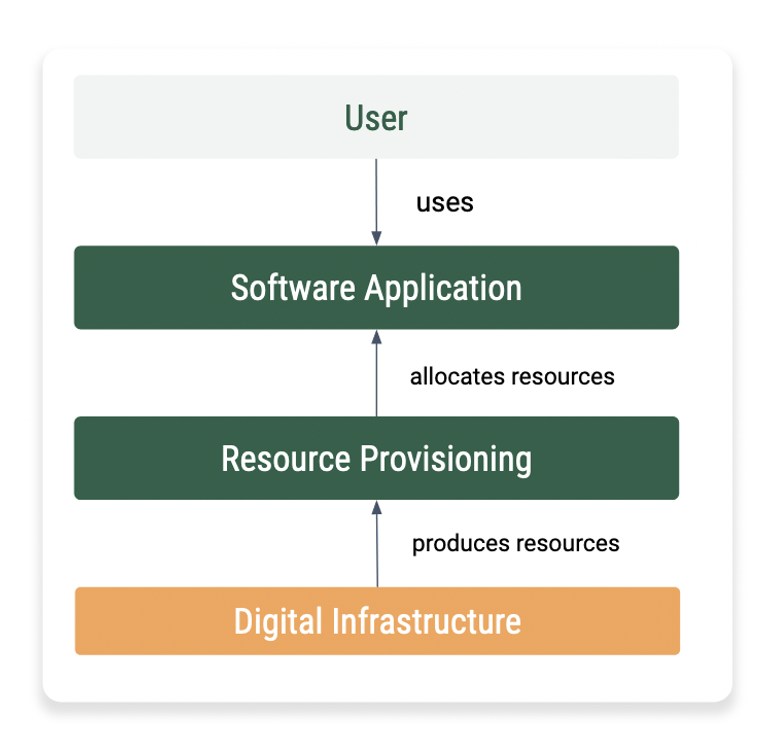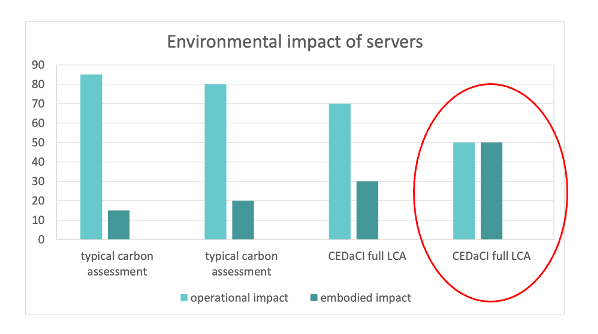Our Vision
We are at a juncture; digital technology is integral to every part of our life, yet we are not in control of how it will evolve for ourselves and future generations. The digital economy is growing exponentially, yet society is lacking knowledge and democratic institutions & process that shape its direction.
A sustainable digital future is one that balances the needs of the environment, society and the economy and is built upon humanity-driven values – that is our ‘leitmotif’.
Increasingly the software engineering community is realizing its role and responsibility in reducing the environmental impact of their digital products – in taking part in creating a sustainable digital future. While many commercial actors are rushing into the market to provide tools & knowledge, there is a lack of independent, verified and accessible knowledge for developers, architects, product managers, experience designers and other digital product makers.
The Salesforce Green Code Gap Survey (2022)1 :This survey of over 1,000 software developers in the United States, United Kingdom, and Australia found that 75% of respondents are eager to help reduce their environmental impact, but green coding and sustainability aren't yet practiced at their job. The survey also found that the main barriers to green software development are a lack of skills or knowledge, and a lack of prioritization by employers.
At Leitmotiv, we have extensive knowledge on the topic of sustainable software, as it is an integral part of the sustainability roadmap for digital infrastructure, we created in 2021 (here). We have led multi-year research projects with the EU, German Environmental Protection Agency, and conducted studies on behalf of the Netherlands and North Holland.
Over the last three years, we have created an ecosystem of knowledge-sharing, through events, hackathons and webinars which has already led to the development of a 1000+ people strong community, however the community is lacking a comprehensive knowledge base and learning materials which we would like to develop further in the context of this Wiki.
Together, we can enable the software development community to take their role in the creation of a sustainable digital economy.
Actions
- Launch and maintain an independent, curated, verified knowledge hub on sustainable digital product practices
- Create learning content (videos, podcasts) around sustainable digital product development that enables practitioners to get started quickly with best practices and fundamental knowledge
- Organize open knowledge sharing sessions both offline and online to further expand the community of ‘sustainable digital product practitioners’
Why this matters

The digital economy is made of digital products and services. These products & services are made using software. Software is consuming digital resources to operate, using more resources with more usage. It is software that is driving the demand for more servers, more data centers, more infrastructure, yet most digital product makers are not aware of the direct environmental impact created by their work.
In a 2021 study2 of a large software company, researchers identified the main challenges in adopting sustainable software development practices as lack of awareness, a lack of resources, and a lack of support from leadership.
Microsoft quickly launched a Green Software Foundation3, which is an industry-led, membership body which is driving the standardization of carbon-accounting methodologies for software. Yet their approach does not at all accounting for consuming less resources, which would not be in the interest of a cloud infrastructure operator, and it reduces the environmental impact to energy alone.
LSBU has shown in the CEDaCI project4 that the impact from the manufacturing of servers is at least equal that of the energy consumption during operation.

We believe that knowledge, best practice, and guidelines need to be developed outside of the field of influence of the providers that benefit the most from inefficient software (e.g., cloud providers earn more money the more resources a software application is consuming). The knowledge needs to be verified and completely open, so that a community and researchers can use it to further develop knowledge & insights.
Further, it needs to be open to collaborate and contribution (see how we designed the editing process for this Wiki).
What we are going to do (‘actions’)
A trustworthy knowledge hub (‘wiki’) built on the foundations of open knowledge5 should be created to collect information, best practice and educational content which helps the software sector to implement meaningful practices to reduce its environmental footprint.
Building on the open ecosystem
To create an open knowledge hub, existing, open, technology such as Jekyll can be used. To showcase a key tenant of sustainable digital products - transparency - the knowledge hub itself, will report its real-time environmental impact by using existing infrastructure provided by Leitmotiv.
Through various government-funded projects, Leitmotiv has already established digital infrastructure that is transparent about it’s own environmental impact as well as a laboratory in which any software or programming code can be measured.
The result is an open knowledge platform where contributors can make changes to the content, add new knowledge or debate improvements, while at the same time having a real-world example of a digital application that reports its environmental footprint.
Combining existing knowledge
A lot of knowledge already exists across various academic & government projects, as well as public & community sources. In Germany, for example, the Environmental Protection Agency, releases academic research on green software and the Blue Angel certification (the German environmental label) contains many useful best practices.
In the Netherlands, the VU Amsterdam has released best practices within the department of Sustainable Software. In France, a community effort called Boavizta, has released useful APIs to determine the environmental impact of ICT equipment.
This knowledge is currently spread across various organizations and websites. Put together they form the answers to most questions and challenges that most product makers & developers are facing when building sustainable digital products today.
Leitmotiv has already assembled a vast array of knowledge into its own internal knowledge base, comprising a broad overview{ target=“_blank” } of IT Sustainability as well as sustainable principles for software developers.
The goal is to bring all the available knowledge into a single place, and engage the communities, researchers and government agencies to help maintain and contribute to the shared knowledge repository - an Open Knowledge Hub for Sustainable Digital Products.
Materials for education
Another aspect which has been highlighted by educational institutions is the available of training materials & tooling to experiment with different approaches to reducing the environmental impact of software.
Having produced existing learning content for government agencies, large IT organizations as well as digital learning experiences, Leitmotiv acts as a provider & synthesizer of knowledge, making it openly available and accessible to a broader audience.
All of the existing learning materials will be contributed to the knowledge hub as well as new learning materials produced together with the sustainable software community.
Providing knowledge & structured data
Two types of knowledge are especially useful and benefit from a collaborative approach: Best practices & application benchmarks.
A list of verified best practices, with programming examples or exercises, as well as an example repository which can be re-run on a measurement infrastructure (such as the open SDIA laboratory) is especially valuable at the moment as the practice of making sustainable digital products is emerging.
The second database, includes application benchmarks & classifications to enable the comparison of various digital products with each other on the basis of environmental performance. The idea is that developers can choose to publish their measurements together with the functionality that was observed, and then provide the results as benchmarking data.
Creating open knowledge rests on 3 pillars: A knowledge platform, community and independent governance
We propose to create an open knowledge hub, under the umbrella of Leitmotiv, an independent organization which is vendor-neutral and can provide the knowledge platform (‘wiki’). Leitmotiv is in a good position to oversee the curation & verification of contributions and maintain a community of practitioners who continuously contribute new knowledge on sustainable digital products.
What will result (‘outcomes’)
- An independent, verified repository of knowledge as an open, public wiki which contains the up-to-date information on sustainable digital product design, engineering & architecture
- An active community that maintains the knowledge, contributes new insights and continuously verifies the information
- A learning path for anyone in the software community who wants to engage in the topic of sustainability – reducing environmental impact or ensuring a positive social impact of their digital products
Where will it lead (‘impact’)
- Trustworthy, non-commercial knowledge on the environmental impact of software and how to reduce it
- Knowledge that is verified using measurements & real-world testing
- Enables everyone in the software community or practicing a software-related role to take climate & social action
- A practical handbook that can spread a across the community
- Awareness for the sustainability impacts of software and what everyone can do about it
https://www.salesforce.com/news/stories/green-software-research/ ↩
Foster, J., & Serebrenik, A. (2021). Achieving sustainable software development: A case study. IEEE Software, 38(5), 24-31. ↩
